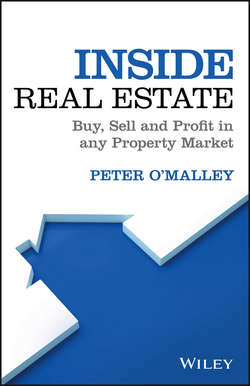Читать книгу Inside Real Estate - O'Malley Peter - Страница 12
На сайте Литреса книга снята с продажи.
PART I
Mastering property
The real estate game
6 Emotion versus logic – understanding fear and loss
ОглавлениеBuying or selling residential real estate is likely to be one of the most emotionally charged transactions you will ever enter into. Whether it's our first home, one of several moves on the property ladder or time to downsize, we all want to love where we live. While seasoned investors may take a more hard-headed approach to their purchases, most home buyers are in danger of letting heart rule head. If you are buying or selling while in an emotional state, you can sometimes make poor decisions. Such a situation should be avoided at all costs.
Some of the trigger points for emotional buying are feeling pressured or rushed; the fear that another property in a sought-after location won't come up again in a hurry; concerns about prices moving beyond a budget, or that prices may fall rapidly; and trying to align the timing in a buying and selling scenario.
Whether as a buyer who overpays or as a seller who declines the best offer we are likely to get, we are all susceptible to making regrettable decisions when negotiating price and terms on the family home. Before entering the real estate market, it is important to try to understand the difference between emotion and logic in the decision-making process. Know what the trigger points are. Talk to friends and family about what they may have based buying or selling decisions on. Keep reading this book. And find a trusted adviser in a reputable real estate agency.
Do as much homework as possible before setting out on the buying and selling journey. We all like to draw pragmatic and logical conclusions, but this is less likely to happen if we let our emotions eclipse our logic. Wisdom in hindsight can reveal very costly errors.
Many people suffer buyer's remorse or seller's remorse after the transaction.
Buyer's remorse sees a buyer feeling they either bought the wrong home or paid too much because they were in an emotional state when negotiating the purchase. Once the emotional stress of the immediate situation dies down, they begin to question the logical merits of their purchase. Some who seriously regret the emotional decision they have made carry around buyer's remorse for years after the event.
Seller's remorse sees a seller feeling as though they undersold or should not have sold. They may have made a hasty decision they now regret. Many a vendor has suffered seller's remorse after an auction, recalling how they succumbed to the pressure an agent put on them to lower the reserve price when the auction stalled.
A reluctant vendor who is selling the family home of 40 years needs to accept that a buyer won't compensate them for their happy memories. The buyer is purchasing tangible goods – bricks and mortar, if you like. Sure, the buyer may be in a competitive bidding scenario against other buyers, which pushes the price up, but this is simply the market at work. A buyer will rarely pay more because the owner has emotionally overpriced the property. Interestingly though, some sellers unconsciously overprice their family home as a means of scaring buyers off (‘I will only sell if I get this price'), which of course diminishes the chances of a sale.
Конец ознакомительного фрагмента. Купить книгу
